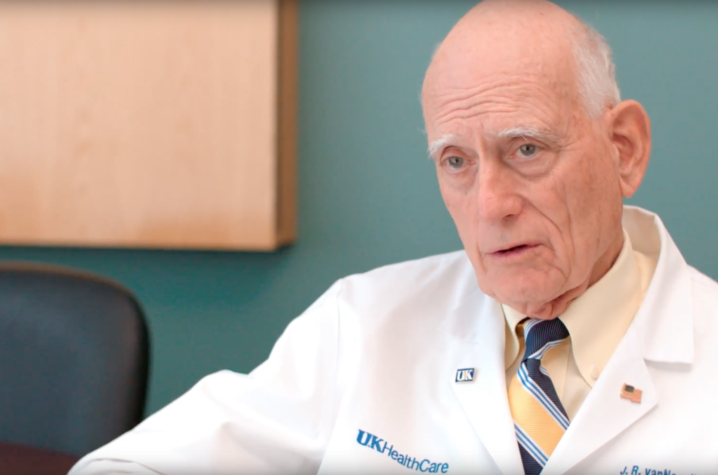30 Years and Going Strong: Markey's Van Nagell on the Legacy of the Ovarian Cancer Screening Program
LEXINGTON, Ky. (March 27, 2017) – As a native of Oldham County, the University of Kentucky has always been close to Dr. John van Nagell's heart.
To begin his medical career, van Nagell went Northeast to earn an undergraduate degree at Harvard University and a medical degree from the University of Pennsylvania, but says he was always looking to come back to Kentucky.
"I always wanted to come home," van Nagell said. "And when it came time for me to decide where I wanted to undergo further training, the University of Kentucky had just opened an outstanding new medical center."
Specializing in gynecologic oncology – the diagnosis, research and treatment of women's cancers – van Nagell joined UK as a resident in 1967, some 16 years before the UK Markey Cancer Center was officially born. He's spent his career at UK diagnosing and treating patients, and mentoring and teaching young doctors, but his lasting legacy will likely be his research.
In 1987, van Nagell began the Ovarian Cancer Screening Program, building the program through funding provided by the Kentucky Extension Homemakers Association. This ongoing research study provides free cancer screenings by transvaginal ultrasound to women who are over the age of 50 or over the age of 25 with a family history of ovarian cancer.
"We've been able to detect ovarian cancer at an earlier stage in many women, rather than just waiting for symptoms to occur," van Nagell said. "The survival rate of women in our program who have ovarian cancer is roughly double that of women who didn't get screened."
Now in its 30th year, the screening program has provided free screenings to more than 46,000 women, with 775 ovarian tumors and 103 malignancies found. Though the use of transvaginal ultrasound as a screening method has been controversial over the years – with critics suggesting it may lead to unnecessary surgeries – van Nagell emphasizes that newer technologies such as molecular genetic testing will help them identify women with the highest risk profile who could most benefit, and the research itself has already taught physicians much about finding malignancies.
"We now know, because of this screening program, that certain ovarian cysts are always benign," he said. "What we're saying is, more research needs to be done, and we're doing it. And if we can provide free screening along the way to an at-risk population, that's beneficial."
With 50 years of experience at UK under his belt, van Nagell says he remains "as committed as ever," still dedicated to perfecting the work he began three decades ago for his patients.
"All you have to do is go back into the clinic and see one case after another of ladies coming in with advanced ovarian cancers who had no early symptoms, and by the time their symptoms developed, their disease was incurable," he said. "And the most fulfilling part is just seeing women who didn't realize something was wrong, but had a potentially fatal disease, which we were able to detect through screening, successfully treat, and now they're fine."
Regularly cited as one of the "Best Doctors in America," van Nagell recently received another major accolade from his peers. Earlier in March, he attended the 2017 Annual Meeting on Women's Cancer in Baltimore, where he was presented with the Society of Gynecologic Oncology's Distinguished Service Award. This award recognizes individuals who, over an extended period of time, display a continuous outstanding meritorious service in the field of gynecologic oncology.
"It's a great honor, because to be honored by your peers is very special," van Nagell said. "And I believe that -- at least in some small way -- this validates what we have tried to do here, and that is to improve the early detection of a very serious disease... to me, it's all about the lives of people who have been changed for the better by the screening program."





